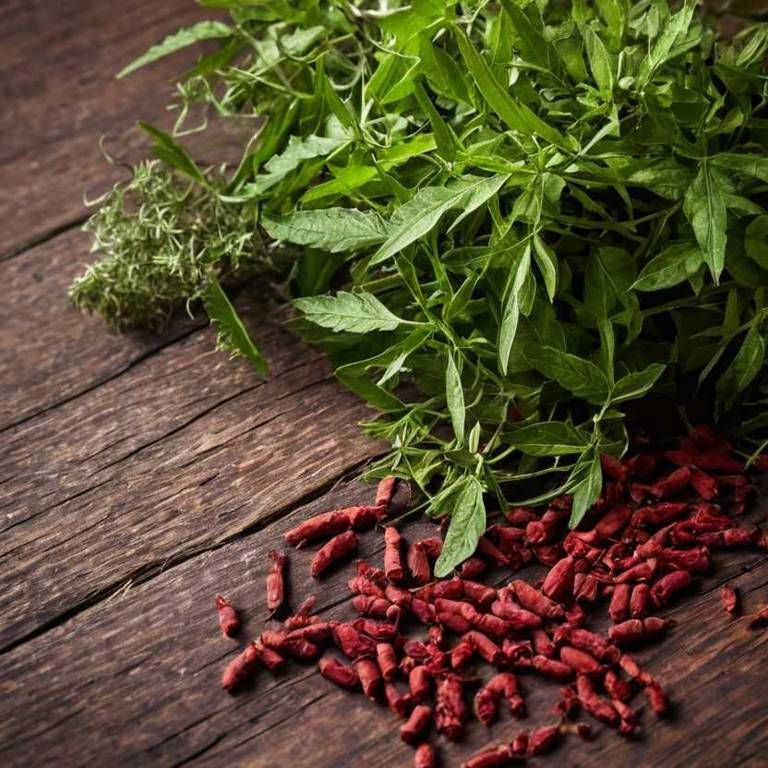By Leen Randell
Updated: Jul 06, 2024
10 Health Benefits Of Rhus Coriaria (Sumach)

Rhus coriaria, also known as sumach, has health benefits such as reducing inflammation and acting as an antioxidant due to its high tannin and phenolic content.
The antiseptic properties of sumach help to prevent infections, making it beneficial for wound healing and skin conditions.
This can improve people's lives by relieving symptoms of conditions like arthritis, eczema, and acne, allowing individuals to lead more comfortable and confident lives.
This article explains in details the 10 best health benefits of Rhus coriaria.
1. Alleviates inflammation
Rhus coriaria alleviates inflammation because of its rich content of flavonoids and polyphenols.
These bioactive compounds have been shown to exhibit potent anti-inflammatory properties by inhibiting the production of pro-inflammatory enzymes, such as cyclooxygenase-2 (COX-2) and lipoxygenase.
Additionally, sumach has been found to possess antioxidant activity, which helps to neutralize free radicals that contribute to inflammation and oxidative stress.
2. Boosts heart health
Rhus coriaria boosts heart health because it is rich in flavonoids and anthocyanins, which have been shown to improve blood flow, lower blood pressure, and reduce inflammation.
The antioxidants present in sumach also help protect the cardiovascular system from damage caused by free radicals, thus reducing the risk of heart disease and stroke.
Additionally, sumach has been found to reduce triglycerides and LDL cholesterol levels, further contributing to its cardioprotective effects.
3. Regulates blood sugar levels
Rhus coriaria regulates blood sugar levels because of its unique combination of bioactive compounds.
The plant's flavonoids and saponins have been shown to inhibit alpha-amylase and alpha-glucosidase enzymes, thereby reducing the absorption of glucose from food into the bloodstream.
This delay in glucose uptake helps to regulate blood sugar levels and improve insulin sensitivity, making it a promising natural remedy for managing type 2 diabetes and related metabolic disorders.
4. Eases digestive issues
Rhus coriaria eases digestive issues because of its unique composition and properties.
The plant's leaves, stems, and roots contain flavonoids, phenolic acids, and other bioactive compounds that exhibit antioxidant, anti-inflammatory, and gastroprotective effects.
These compounds help soothe gastrointestinal mucosa, reduce inflammation, and improve gut motility, alleviating symptoms such as bloating, cramps, diarrhea, and constipation associated with digestive disorders like irritable bowel syndrome (IBS) and gastritis.
5. Supports skin health
Rhus coriaria supports skin health because of its rich antioxidant and anti-inflammatory properties.
The plant's extracts have been shown to exhibit potent free radical-scavenging activity, protecting the skin from damage caused by UV radiation and environmental stressors.
Additionally, sumach has been found to inhibit inflammation, reducing redness and irritation while promoting healthy skin tissue regeneration, ultimately leading to a more radiant and youthful complexion.
6. Possesses antimicrobial properties
Rhus coriaria possesses antimicrobial properties because of its unique chemical composition.
The plant contains a high concentration of gallic acid and other phenolic compounds that exhibit strong antibacterial and antifungal activities. These compounds interfere with the cell membranes of microorganisms, disrupting their ability to function and ultimately leading to their destruction.
This property makes Rhus coriaria an effective natural remedy against a range of microbial infections.
7. Improves oral health
Rhus coriaria improves oral health because of its rich antioxidant and anti-inflammatory properties.
The plant's extracts have been shown to reduce plaque and tartar buildup, alleviate gum inflammation, and prevent the growth of bacteria that cause bad breath and tooth decay.
Additionally, sumach has antibacterial properties that help combat existing infections, making it a natural remedy for maintaining good oral health and preventing dental problems.
8. Enhances cognitive function
Rhus coriaria enhances cognitive function because of its rich concentration of flavonoids and phenolic acids.
These bioactive compounds have been shown to improve memory and learning by increasing the production of neurotransmitters such as acetylcholine and dopamine. Additionally, sumach's antioxidant properties help protect the brain from oxidative stress and inflammation, which can contribute to cognitive decline and neurodegenerative diseases.
As a result, incorporating sumach into one's diet may provide a natural boost to mental clarity and focus.
9. Reduces risk of cancer
Rhus coriaria reduces risk of cancer because it contains a rich source of antioxidants and flavonoids that help to combat free radicals in the body.
Studies have shown that the extracts from Rhus coriaria exhibit significant inhibitory effects on various types of cancer cells, including breast, lung, and colon cancers.
Its ability to induce apoptosis (cell death) in cancerous cells also makes it a promising candidate for chemoprevention.
10. Boosts immune system
Rhus coriaria boosts immune system because of its rich antioxidant and flavonoid content.
These bioactive compounds have been shown to exhibit anti-inflammatory properties, which help to protect the body from free radical damage and oxidative stress.
Additionally, sumach's antimicrobial and antifungal activities can help to prevent infections and promote overall immune function.